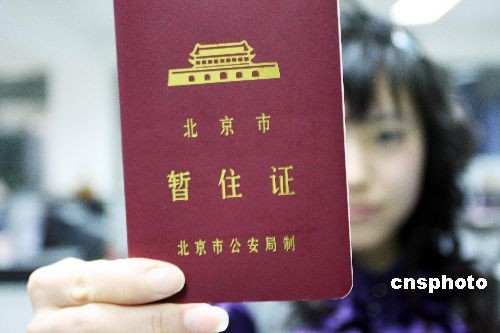Su Qi who works as a computer programmer in Beijing, has been living in the capital city for eight years. She is one of the 6 million incomers to the city who have left their homes to work and live in the metropolis, and who are considered as temporary residents. The non-native residents yearn to settle down, but it is not easy for them to integrate into the city.
There has been strong support for reform of the residence system in Beijing in recent years, aimed at granting immigrant residents equal status to that of natives. Li Fangping, a well-known lawyer, and Hu Xingdou, a professor of economics at Beijing Institute of Technology, jointly submitted a written proposal to the Beijing government on August 28, 2008.
'Will I ever be allowed to integrate into the city?'
|

|
|
A woman shows her Temporary Residence Permit. [Photo: China News Service]
|
Li Fangping, who came to work in Beijing as a lawyer in 1998, has experienced difficulties because he does not hold permanent household registration in Beijing – "Beijing Hukou" as it is often called in Chinese.
In August 2008 Li Fangping filed a lawsuit against the China Netcome (Group) Company Beijing Branch for discrimination in comparison with Beijing Hukou holders.
Su Qi wanted to apply for Beijing Hukou two years after she came to the city, but her application was refused.
It is not easy for incomers to apply for permanent residence in Beijing. The current household registration policy favors well-known artists and entertainers, sports stars, the senior management or technical staff of large enterprises or financial institutions, and talent with overseas educational qualifications.
"I will never be able to integrate into the city," said Su in a subdued voice.
Li Fangping felt the same.
Unbalanced citizens'rights
"I have never participated in an election in Beijing, and I have no political rights here," said Su Qi. "It is too far to go back to my hometown for an election."
People living in Beijing without a permanent residence registration should vote where they are registered as householders. Incomers can vote in the city only if they can present a certificate qualifying them as a voter, Su was told by the local residents'committee.
Su Qi hoped to buy an apartment in Beijing, but she was discouraged by soaring property prices. One of her best friends, with a permanent residence registration in Beijing, has recently moved into a new apartment. Su’s friend was allowed to buy a low-priced unit because she holds a Beijing Hukou.
Such low-priced medium and small homes are sold to middle- and low-income families with Beijing Hukou in accordance with local regulations. "Incomers without a Beijing Hukou are denied these favorable terms," Li told China Newsweek. "It isn't fair."